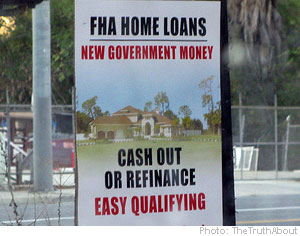 When the sub-prime crisis hit in 2007, we were all bombarded with stories about how this showed the effects of deregulation run amok. Never mind that the housing and banking industries are heavily regulated, the crisis showed we had the wrong kind of regulation. Or perhaps it showed that the Bush administration never had their heart in regulation, so they let the banks get away with murder. I think it’s a bit more complicated than that (Bush did try to rein in Fannie and Freddie) but obviously Bush wasn’t keen on discouraging banks from making housing loans. Just the opposite, he wanted to create an “ownership society.”
When the sub-prime crisis hit in 2007, we were all bombarded with stories about how this showed the effects of deregulation run amok. Never mind that the housing and banking industries are heavily regulated, the crisis showed we had the wrong kind of regulation. Or perhaps it showed that the Bush administration never had their heart in regulation, so they let the banks get away with murder. I think it’s a bit more complicated than that (Bush did try to rein in Fannie and Freddie) but obviously Bush wasn’t keen on discouraging banks from making housing loans. Just the opposite, he wanted to create an “ownership society.”
As a card-carry libertarian I am always a bit skeptical of the notion that “deregulation” is the cause of each and every economic problem that crops up. But I am also aware than many existing regulations (FDIC, TBTF, etc) encourage excessive risk taking by banks, so it’s possible that some regulations might work as second best policies. And it seems to me there was one obvious regulation that would have prevented the sub-prime fiasco:
BAN ALL SUBPRIME MORTAGES
That’s the sine qua non of regulatory responses to the crisis. If we can’t even do what the Canadians and Danes do, make it tough to get a mortgage without at least 20% down, then I don’t see how anyone can say we are serious about regulating the banking industry. Indeed, a minimum 20% down-payment would actually address two market failures; the tendency of banks to takes excessive risks, caused by the bank insurance discussed above, and also the tendency for Americans to save far too little, caused by dozens of tax and subsidy programs that systematically discourage saving and encourage consumption.
So how is the (pro-regulation) Obama administration doing so far? Here’s how Robert Pozen describes their attempt to prevent another subprime bubble:
A few weeks ago, President Barack Obama signed legislation extending an $8,000 tax credit for first-time home buyers. The refundable tax credit, available even if a family has no taxable income, will enable many more buyers to close on a home. But it also could bankrupt the Federal Housing Administration (FHA) and, by doing so, damage an already weak housing market.
This can’t be; Pozen makes it seem like Obama is trying to inflate a new housing bubble, by stimulating a new round of sub-prime mortgages. But perhaps there is some requirement that borrowers put down at least 20% of their own money. Unfortunately, the minimum seems a bit lower than the 20% I had in mind, indeed 20% lower:
Here’s how the credit allows buyers to avoid putting their own money at risk. Suppose a couple making $60,000 annually buys a home worth $200,000. They can get an FHA-insured loan if they put down 3.5% of the purchase price, about $7,000. The couple will also need to come up with another $1,000 in closing costs, for a total of $8,000. The couple can either dip into savings or borrow that money from relatives or somewhere else on a temporary basis.
After closing, the couple can quickly obtain the $8,000 refundable tax credit to pay off their temporary loan (or replenish their savings). In effect, they will have bought a home without putting any of their own money at risk. Owners who don’t sink their own money into a house are much more likely to default on the mortgage.
Say it ain’t so. I can’t believe that after everything we have heard from the left about the sins of Bush-era deregulation, we are again trying to shovel government money to homebuyers with no income and no money for a down-payment. Surely this is the “re-regulation” we were told was necessary? I may have misinterpreted the Pozen article. Feel free to educate me, as I am no export on mortgage lending.
BTW, because I started my blog in February I never had a chance to bash Bush for all his policy errors. So just to show my liberal readers that I am fair and balanced, let me add that Obama’s attitude toward the “War on Drug using Americans” is a vast improvement over the Bush administration. It has even led other nations in Latin America to liberalize their drug laws. That’s “deregulation” that both liberals and libertarians can believe in. And this policy change has occurred in an area that is far more consequential than banking reform.
- Bulenox: Get 45% to 91% OFF ... Use Discount Code: UNO
- Risk Our Money Not Yours | Get 50% to 90% OFF ... Use Discount Code: MMBVBKSM
Disclaimer: This page contains affiliate links. If you choose to make a purchase after clicking a link, we may receive a commission at no additional cost to you. Thank you for your support!


Leave a Reply